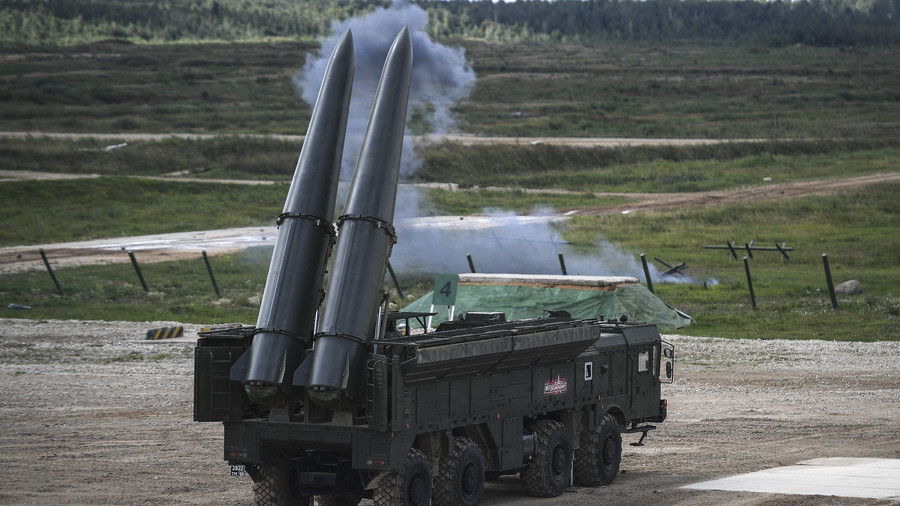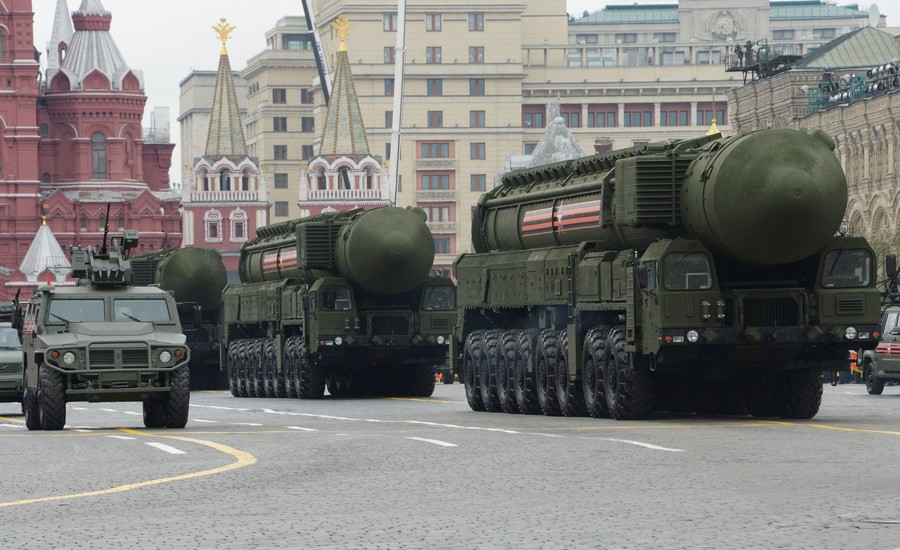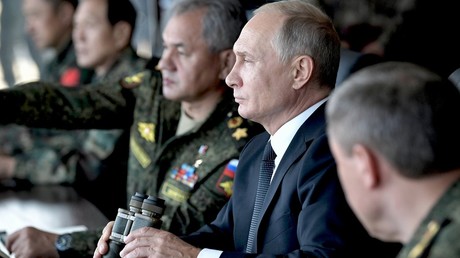- Joined
- Aug 8, 2008
- Messages
- 6,070
- Points
- 83
https://www.rt.com/russia/444573-russian-nuclear-doctrine-amendment/
Senators propose change of doctrine so Russia could respond with nukes to any ‘strategic strike’
Published time: 21 Nov, 2018 17:54 Edited time: 21 Nov, 2018 18:15
Get short URL

An Iskander-M launcher on display. The system is capble of shooting short-range nuclear-tipped missiles. ©Sputnik / Ramil Sidrikov
A suggestion to make the Russian nuclear doctrine more flexible was backed by the upper chamber of the Russian parliament as part of a wider package of recommendations on how to streamline and improve legislation regulating the use of national armed forces.
The senators said the Russian National Security Council should prepare and propose an amendment on the key strategic deterrence document, which would allow “taking a decision to retaliate in case of enemy use of hypotonic weapons and other strategic conventional weapons” against Russia, reported RIA Novosti.

Yars ICBM launchers during a military parade. Sputnik / Ilya Pitalev
Russian nuclear doctrine was last reviewed in 2014, when the current escalation of tensions with the West was just unfolding.
It allows the armed forces to deploy nuclear weapons on two scenarios. One is in response to a strike with a nuclear weapon or another weapon of mass destruction against Russia or one of its allies. Another is when a nuclear strike is necessary to prevent a conventional attack threatening the existence of Russia as a sovereign state.
READ MORE: US nuclear buildup shows new arms race has already begun – German FM
The US has since amended its nuclear posture, relaxing restrictions on when it could use nuclear weapons. The latest review published in February is intentionally somewhat vague, but it called for developing new kinds of nuclear weapons and indicated that the US may nuke a country for as little as launching a cyberattack against America or one of its allies.
Read more
 Russia won’t be dragged into new arms race, but will respond to US withdrawal from INF – Putin
Russia won’t be dragged into new arms race, but will respond to US withdrawal from INF – Putin
Further destabilizing the deterrence architecture is the US’ declared intention to withdraw from the Intermediate-Range Nuclear Forces (INF) Treaty, a key Cold War era agreement with Russia which led to large-scale denuclearization of Europe. The treaty banned both the US and Russia from developing and deploying nuclear-capable land-based missiles with the range best suited for an exchange between Russia and European members of NATO.
The hundreds of such weapons deployed by each side prior to sealing the INF agreement were a major destabilizing factor. They required only minutes in flight to reach their targets, as opposed to dozens of minutes for intercontinental missiles. So if a launch were to be detected, it would leave almost no time to assess whether it was an actual attack requiring a response or a false alarm.
The recommendations from the Senate were the result of a round table discussion with officials from the Defense Ministry, the General Staff and the Security Council. Another suggestion made is for the Russian Foreign Ministry to seek an agreement with foreign nations close to Russia to ban hosting of sites conducting biological research with military applications by third parties – an obvious jab at a suspected site of this nature located in Georgia.
Like this story? Share it with a friend!
Senators propose change of doctrine so Russia could respond with nukes to any ‘strategic strike’
Published time: 21 Nov, 2018 17:54 Edited time: 21 Nov, 2018 18:15
Get short URL

An Iskander-M launcher on display. The system is capble of shooting short-range nuclear-tipped missiles. ©Sputnik / Ramil Sidrikov
- 145
A suggestion to make the Russian nuclear doctrine more flexible was backed by the upper chamber of the Russian parliament as part of a wider package of recommendations on how to streamline and improve legislation regulating the use of national armed forces.
The senators said the Russian National Security Council should prepare and propose an amendment on the key strategic deterrence document, which would allow “taking a decision to retaliate in case of enemy use of hypotonic weapons and other strategic conventional weapons” against Russia, reported RIA Novosti.

Yars ICBM launchers during a military parade. Sputnik / Ilya Pitalev
Russian nuclear doctrine was last reviewed in 2014, when the current escalation of tensions with the West was just unfolding.
It allows the armed forces to deploy nuclear weapons on two scenarios. One is in response to a strike with a nuclear weapon or another weapon of mass destruction against Russia or one of its allies. Another is when a nuclear strike is necessary to prevent a conventional attack threatening the existence of Russia as a sovereign state.
READ MORE: US nuclear buildup shows new arms race has already begun – German FM
The US has since amended its nuclear posture, relaxing restrictions on when it could use nuclear weapons. The latest review published in February is intentionally somewhat vague, but it called for developing new kinds of nuclear weapons and indicated that the US may nuke a country for as little as launching a cyberattack against America or one of its allies.
Read more
 Russia won’t be dragged into new arms race, but will respond to US withdrawal from INF – Putin
Russia won’t be dragged into new arms race, but will respond to US withdrawal from INF – Putin Further destabilizing the deterrence architecture is the US’ declared intention to withdraw from the Intermediate-Range Nuclear Forces (INF) Treaty, a key Cold War era agreement with Russia which led to large-scale denuclearization of Europe. The treaty banned both the US and Russia from developing and deploying nuclear-capable land-based missiles with the range best suited for an exchange between Russia and European members of NATO.
The hundreds of such weapons deployed by each side prior to sealing the INF agreement were a major destabilizing factor. They required only minutes in flight to reach their targets, as opposed to dozens of minutes for intercontinental missiles. So if a launch were to be detected, it would leave almost no time to assess whether it was an actual attack requiring a response or a false alarm.
The recommendations from the Senate were the result of a round table discussion with officials from the Defense Ministry, the General Staff and the Security Council. Another suggestion made is for the Russian Foreign Ministry to seek an agreement with foreign nations close to Russia to ban hosting of sites conducting biological research with military applications by third parties – an obvious jab at a suspected site of this nature located in Georgia.
Like this story? Share it with a friend!
